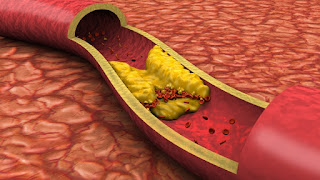Hello again ;)
For my part I would like to say that I'm super happy about having so many visits to my blog. Only the month of September I received almost 1,700 visitors from around the world. I also know that many people are reading, and learning about how to interpret the signals that our body sends when something is not working well.
Today I want to talk about something very important: CHOLESTEROL.
I worked so many hours in this article because it is a very complex issue, and needed to make it easy to understand for everyone. I hope I have succeeded.
Previously, I talked about Lipids or fats in our blood but Today I will talk specifically about cholesterol, and its importance on the functioning of our body, and how it at high levels will negatively affect our health. I will also remark the difference between "good cholesterol" and "bad cholesterol". I will also explain which one it is the one we must get decreased, and which one must get increased in order to maintain our veins clean or fat free.
Cholesterol:
What is cholesterol?
Cholesterol is a type of natural fat from our body. Cholesterol is a lipid that can be found in different body tissues, also in our liver, heart, pancreas, brain, spinal cord and in our blood plasma as well. Cholesterol is very important substance for the proper functioning of our body.
What is the role of cholesterol?
Our body needs cholesterol to produce vitamins, hormones like progesterone, testosterone, and to produce bile acids that help in the digestion of fats. Cholesterol is partaker of calcium metabolism in our body among some other important functions.
Where does cholesterol come from?
There are two ways in which our body produces cholesterol: External that comes from our diet when it is absorbed from the food we eat and the Internal that is produced by our liver. Once cholesterol is produced, it enters the bloodstream where it is distributed to different systems of our body.
How cholesterol is transported to different systems of our body?
Cholesterol is transported through our blood by two lipoproteins: low density lipoprotein (LDL) which is responsible for carrying cholesterol to tissues and its excess is related to arteriosclerosis and high density (HDL) responsible of removing excess cholesterol from cells and fat in the veins.
(LDL)or bad cholesterol is so called because it is responsible for transferring cholesterol from our liver to all systems in our body, causing fat deposits in arteries and veins, narrowing them and reducing their elasticity, which could eventually produce a heart attack and / or stroke. Bad cholesterol (LDL) is significantly associated with heart disease. From this arises the importance of laboratory tests performed regularly to keep it the ideal range. If this is high, then you should implement the recommendations I will give you to try to bring the bad cholesterol to levels that do not endanger your life.
Here we can notice how the accumulation of cholesterol in the vein or artery hinders the free passage of blood flow, making our heart work harder.
These images more easily help us as the "bad cholesterol" is accumulated in our veins and arteries, blocking the blood flow. The ideal range of bad cholesterol (LDL) should be below 100 mg / dl.
Why cholesterol levels are increased?
The first reason is the INHERITANCE, then the very high diet in saturated fats, mainly from animal fats such as meat fat, milk fat, butter, cheese, plus consumption VEGETABLE OILS HYDROGENATED as margarine (biscuits , industrialized breads, sweets).
RECOMMENDATIONS TO REDUCE BAD CHOLESTEROL.
But if the bad o) LDL) is greater than 100 mg / dl how can we reduce it?
1. Reduce intake of junk foods.
2. Avoid or reduce consumption of foods with saturated fats.
.How Can recognize some saturated fats?
Are those foods that remain solid at room temperature such as margarine, butter, animal fats and cheeses.
This illustration will help us when choosing our foods low in cholesterol. Note that we should stay away from products that are within the purple area, the most recommended to consume those within the green zone.
FOODS THAT HELP LOWER CHOLESTEROL BAD O (LDL)
HDL) It is called "good cholesterol" because it acts as a broom picking up cholesterol in our body, our circulatory system, cleaning and returning it to our liver.
It is advisable to keep good cholesterol levels between 40 mg / dl and 60 mg / dl because it is what protects us from heart disease.
But if we have less than 40 mg / dl good cholesterol, what should we do to increase it?
Reduce consumption of biscuits, industrialized breads, snacks and junk food, sausage, pate, salami, sausages, fatty meats.
Avoid cigarette.
Eliminate from your diet or reduce the fritters.
Include in the diet olive oil and / or sunflower oil, avocado, nuts.
Do cardiovascular exercise daily at least 30 minutes a day / 5 days a week. This can include walking, biking or swimming.
This will help you lose weight if you are with a few extra kilos, and also will increase your good cholesterol levels (HDL).
Increase intake of fish, omega-3 source to protect your heart.
Remember to constantly check the good and bad cholesterol and make the necessary corrections because this is is the key to maintain appropriate levels and also keep heart disease away from our lives.
I hope I have been quite clear and you can also my blog with family and friends. Thank you very much again for your continued support. Cynthia;)






















